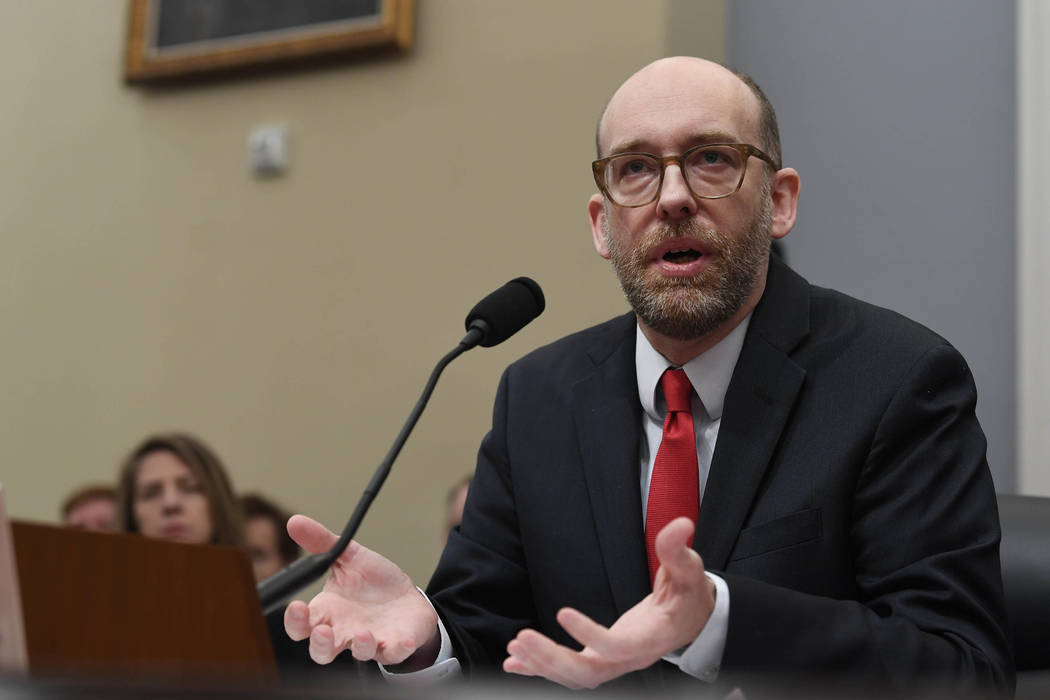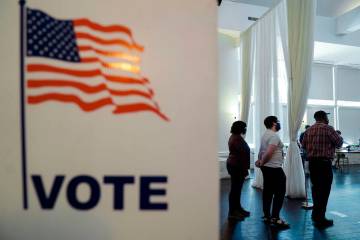Trump budget gets cold reception from House panel
WASHINGTON — President Donald Trump’s 2020 budget calling for $4.7 trillion in spending landed with a thud Tuesday in the House Budget Committee where Democrats said the irresponsible blueprint calls for extreme cuts to Medicare, Medicaid and other programs.
Chairman John Yarmuth, D-Ky., said the $1 trillion in cuts to non-military spending would hurt not only seniors, but also students, the environment and veterans. Yarmuth said the slashing of spending was not not mere belt tightening but “extreme to a level that is malicious.”
Democrats quizzed Russell Vought, acting director of the White House Office of Management and Budget, on program cuts to community block grants, affordable housing, as well as proposals that include revived licensing hearings for the Yucca Mountain nuclear project.
Rep. Steven Horsford, D-Nev., pointedly asked Vought why Trump was “breaking his promise” to Nevada in October when he agreed with residents during a campaign stop that a nuclear waste repository should not be located in the state if the state doesn’t want it.
Trump instead is proposing $116 million for the Department of Energy to revive the licensing process on its application to build a waste storage facility at Yucca Mountain and implement an interim storage program.
The budget also calls for $38 million for lawyers, staff and preparation at the Nuclear Regulatory Commission for revived hearings on the Yucca Mountain application.
“Well, Mr. President, if you agree with the state of Nevada, what changed?” Horsford asked.
Horsford produced a letter by Nevada Gov. Steve Sisolak to Trump seeking a one-on-one meeting about Yucca Mountain and a recent shipment by the Department of Energy of one-half metric ton of weapons-grade plutonium from South Carolina to the Nevada National Security Site.
The letter was placed into the record by the committee chairman.
Using military money for the wall
Horsford also questioned other items in the budget for fiscal year 2020, which begins Oct. 1.
It calls for back filling $3.6 billion in military construction project accounts the administration wants to take from this year’s budget under a national emergency declaration to build a portion of the Southwest border wall.
Four military construction projects in Nevada, all in Horsford’s district and totalling $97 million, have been targeted by the administration as sources for wall funding. The projects in include two predator drone facilities at Creech AFB, a helicopter rescue simulator at Nellis AFB and a National Guard center in North Las Vegas.
An exasperated Horsford declared: “This administration’s budget is dead on arrival in the House.”
Republicans, however, defended the proposal as inspirational, but Democrats characterized the document as chock-full of budget gimmickry to avoid mandatory spending caps and increase military spending to $750 billion, and to provide an additional $8.6 billion for the border wall in fiscal 2020.
To offset that spending, the budget proposes cuts in non-military spending.
Vought said mandatory spending for Medicare, Medicaid and other social programs were growing at a rate that “threatens the freedom of future generations.”
“We think spending is a problem,” Vought said.
But in addition to the spending cuts, the budget outlines more tax cuts. Vought said the corporate and other tax cuts in the budget blueprint were crucial to prolonged economic growth.
Yarmuth called the tax cuts another giveaway to the wealthy over the “tax scam” Republicans passed last Congress.
And the chairman said the president’s third budget to Congress would cripple the country’s economy by disinvesting in education, health care, law enforcement, veterans care and science.
“It is a complete abandonment of our responsibility to the American people, and it is intentional,” Yarmuth said.
Reining in Medicare with block grants
Medicare, the health care program for the elderly, would be cut by $845 billion over 10 years. Medicaid, the program for the poor, would be cut by $241 billion over 10 years, and repackaged into block grants that would be sent to the states to prioritize spending of the reduced funds.
“Why are you going after the vulnerable in this budget?” Rep. Sheila Jackson Lee, D-Texas, asked Vought.
Vought said Medicaid expansion, which occurred in many states including Nevada, would be replaced by the block grants, which would lower the federal share of the program that he said has lost focus on the disabled and those who truly need it, by covering able-bodied adults.
“Medicaid has lost focus on women and children,” Vought said.
Vought said the administration thinks the reforms it put forward with block grants would provide better protection for the populations Medicaid was originally designed to cover.
About 256,000 Nevadans would lose health care coverage if the Medicaid expansion were to be repealed, according to the Henry J. Kaiser Family Foundation, a non-partisan research group.
Horsford accused the Trump administration of using the budget to accomplish what it could not get done with a Republican-controlled House, Senate and White House: Repealing the Affordable Care Act.
The ACA allowed states to expand Medicaid to help provide health insurance to those who lacked care. The expansion was favored by Democratic and Republican governors, alike, including former Nevada Gov. Brian Sandoval, the first Republican governor to expand Medicaid.
Vought admitted the budget forecasts $1 trillion deficits for the next decade and won’t balance until 15 years out, assuming growth and revenue projections hold.
Conservatives on the committee complimented the administration for proposals to cut spending on social programs, and praised the recently implemented tax cuts approved by the past Congress, although that revenue loss is contributing to the deficit.
Yarmuth, though, said “on top of all the damage done in the name of so-called fiscal restraint, this budget calls for a trillion dollars in additional tax cuts for the wealthy.”
That, the chairman said, would give corporations another break “while adding trillions to our deficits.”
Contact Gary Martin at gmartin@reviewjournal.com or 202-662-7390. Follow @garymartindc on Twitter.























